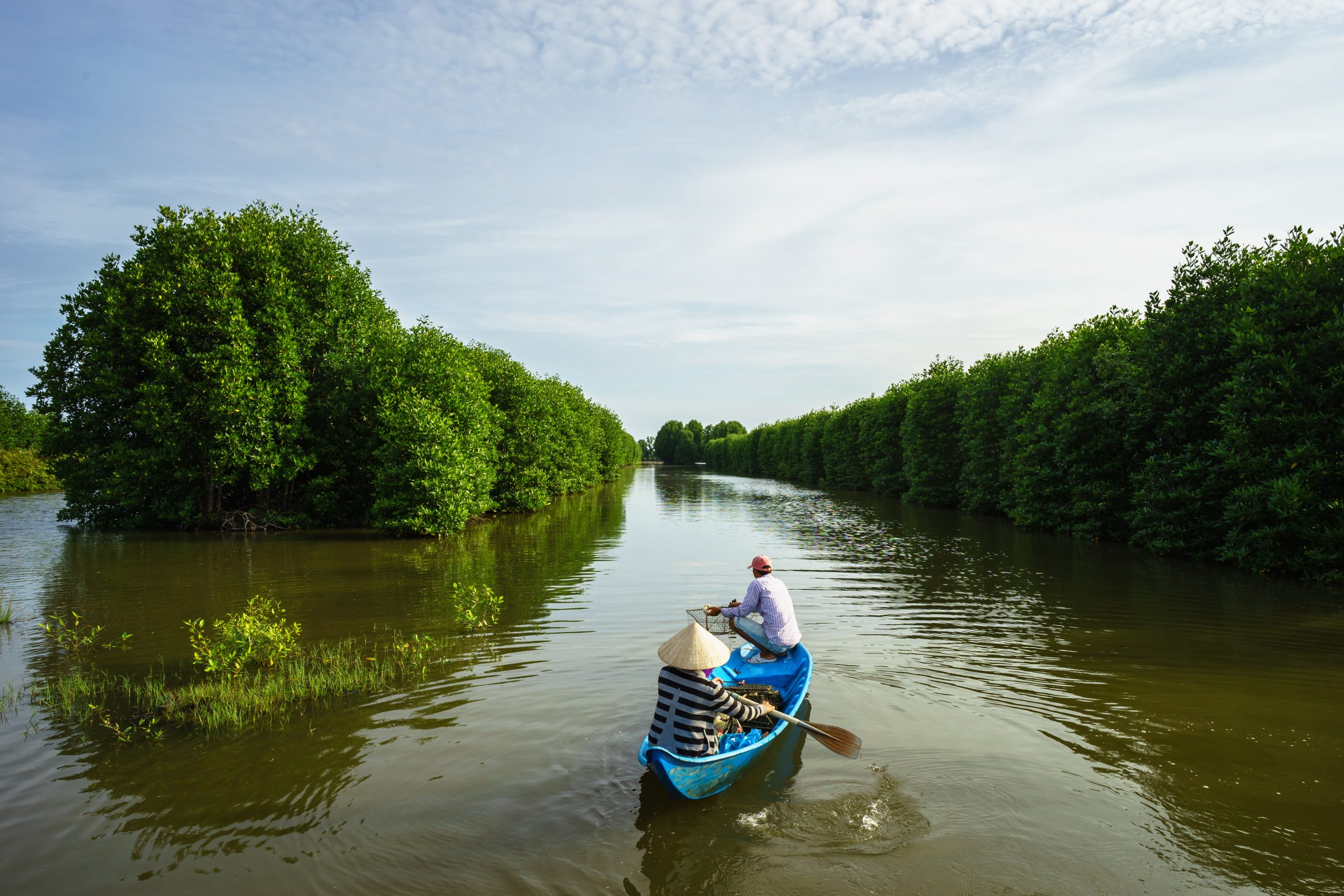
Scaling climate resilient mangrove shrimp farming in the Mekong Delta
59%
41%
Partner contribution
$ 902,000
DFAT contribution
$ 650,000
Total Value
$ 1,552,000
Start: November 2023 - End: November 2025

Australian Department of Foreign Affairs and Trade
The Australian Department of Foreign Affairs and Trade works with international partners and other countries to tackle global challenges, increase trade and investment opportunities, protect international rules, keep our region stable and help Australians overseas.

Symmetry
Symmetry is a social enterprise specialising in designing and mobilising finance for nature-based solutions, covering forestry, agriculture, water, local energy, and biodiversity.

Vietnam Sustainable Shrimp Alliance
The Vietnam Sustainable Shrimp Alliance (VSSA) provides an existing platform to bring together groups along the shrimp supply chain to support the transition to a more sustainable and inclusive shrimp industry.

Southern Shrimp JSC
Southern Shrimp JSC (SVS) is a shrimp processing and export company which aims to be a leader in certified organic shrimp production in the Mekong Delta.
A partnership to train smallholder farmers in climate resilient farming techniques that will improve the shrimp supply chain while also enhancing the mangrove landscape in the Mekong Delta.
Context
The Mekong Delta’s Ca Mau peninsula produces the highest numbers of shrimp in Vietnam, accounting for more than 30% of the country’s total production. For local communities in Ca Mau, the shrimp industry is one of only a few opportunities to create a livelihood in agriculture however these opportunities are becoming increasingly limited.
Small-scale farms provide most of the shrimp production in extensive farming systems in Ca Mau. There are widespread examples of farms underperforming and even being abandoned, with farmers struggling to make a living using pond management systems that are inappropriate to the local ecological context. Farmers are unable to make sufficient investments in the face of growing risks from disease, price fluctuations and climate change.
Climate change increasingly impacts agricultural production and local livelihoods across the Mekong Delta and beyond. Sea level rise, reduced water flows and storm surges means that saltwater intrusion is a growing risk to production, sped up by freshwater extraction, upstream damming, and mangrove decline.
Unplanned and unregulated shrimp farming, driven by growing international demand, has had devastating effects on the Mekong Delta’s mangrove forests. Mangrove forests are mainly distributed along the coastal saline swamps and estuaries in Ca Mau. The large-scale clearance of mangroves has exposed the coast to accelerated erosion, as trees no longer attenuate waves and bind the soil, making it increasingly vulnerable to the impacts of climate change.
In addition, women remain more vulnerable to climate change risks due to gender-based differences in access to assets and credit, treatment by formal institutions, and limited access to information and extension.
About the initiative
This partnership will train smallholder farmers to practice climate resilient farming techniques that will improve the shrimp supply chain while also enhancing the mangrove landscape.
Integrated Mangrove Shrimp (IMS) is a method of aquaculture farming in brackish water, within an extensive farming system, where shrimp and other produce (crabs, snails, and timber) are farmed with a high-level of mangrove cover. It provides a biodiversity-friendly and resilient farming practice when meeting organic certification standards.
By taking part in this initiative, smallholder shrimp farmers will have the opportunity to become certified IMS providers, opening them up to new markets in areas where there is growing demand, such as Europe, Korea, the USA and Japan.
The project aims to increase mangrove retention and coverage, improving socio-economic impacts and gender inclusion, while building climate resilience. Key activities include:
- Outreach/training for smallholder farmers to show the benefits of IMS certification practices and to encourage take up.
- Provide high-quality inputs, off-take agreements, and certified market linkages for farmers.
- Financial incentives to support the shift and scaling of sustainable IMS models.
- Accessing finance to expand the model via impact investors.
It will also build the financial literacy and business skills of local women and girls in the Ca Mau Peninsula and identify job opportunities for them.
The partnership will look to build on its learnings to mobilise capital and scale the solution.
Key contributions from partners
- Symmetry is the lead partner for this initiative, providing the overall management, including monitoring and evaluation.
- Southern Shrimp JSC will implement the organic shrimp certification, set up an organic shrimp value chain and buy shrimp products from SHF shrimp farms.
- Vietnam Sustainable Shrimp Alliance will support capacity building for involved partners, together with field coordination and management.
- Australian Government is contributing catalytic funding support with gender expertise to strengthen social and commercial impacts, connection to an extensive network, capability building on how to capture report social impact, safeguards standards and practices, national and global recognition.
This partnership is supported through the BPP’s Vietnam Call for Climate Adaptation Partnerships in the Mekong Delta.
